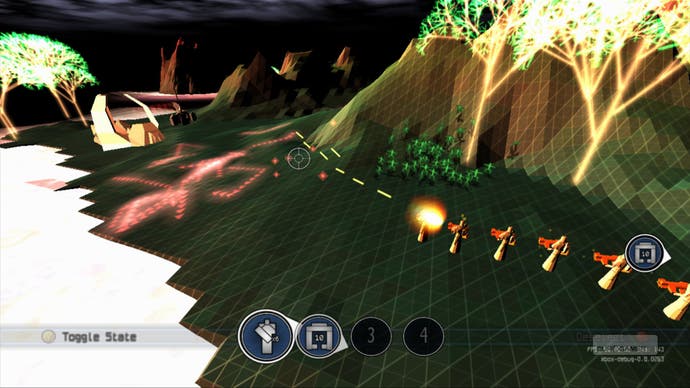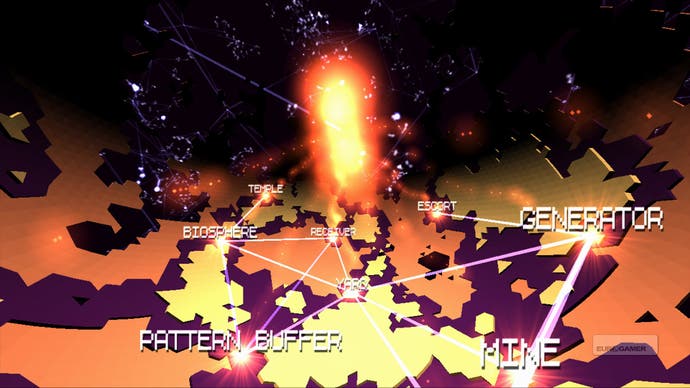Darwinia+
Flat mates.
For gamers of a certain age, Darwinia can be an overwhelming experience. So many familiar ideas, references and images are stirred into its pulsating digital broth that it feels like your brain's been soaked in a gravy of pure nostalgia. Sentinel. Tron. Centipede. Worms. Space Invaders. 3D Ant Attack. Syndicate. Fat Worm Blows A Sparky. Lemmings. The Settlers. Chaos. The retro flavours pile up, bounce off each other and spiral away in joyful new directions. Yet for a game so clearly assembled from traditional ingredients it still feels bracingly new, even in this revamped console edition.
Accidentally hacking your way into the digital domain of Dr Sepulveda, you discover a glowing neon world overrun with an evil virus. The good doctor, looking not unlike Sir Clive Sinclair, quickly schools you in the ways of his virtual creation. An artificial life experiment gone horribly awry, your task is to rid the land of the virus and make it safe for the stiff, inanimate, yet strangely lovable green stick-men known as Darwinians.
To aid you, there are two main tools at your disposal, one being a squad of gun-toting soldiers who can blast away at the snaking virii, and later lob grenades and call in airstrikes to remove more persistent manifestations of the infection like ants, spiders, centipedes and hovering undulating octopus things.
The flipside to the brute force of the squad is the mechanic, a floating Tron-style machine that will reprogram useful control towers and harvest the souls of defeated enemies, ferrying them back to incubators to be reborn as Darwinians. Even these innocent creatures have their uses, able to operate the machinery that keeps Darwinia humming, and as a result most levels become a question of eradicating enemies, restarting mechanisms and then steering the Darwinians into the right place.

So far, so familiar to anyone who played the award-winning PC original. Darwinia+ doesn't reinvent something that already worked to most people's satisfaction, but the changes that have been made are mostly for the better. The game now boasts a tutorial, which eases you in far more seductively than the crude "press H for help" intro of old. It also helps to explain the new joypad-based control system, which is surprisingly effective.
Darwinia was never a game burdened with complex control, so everything maps rather neatly to the buttons. A selects things, B deselects them, X makes them interact with each other. From these core functions pretty much anything you need to do is instinctively obvious, helped along by some helpful AI. Spawn a mechanic near an unconverted gizmo and it'll get to work on it without any prodding from the player. Once it's finished it'll get to work gathering souls, if there are any nearby.
Squads left to their own devices will open fire on enemies that get too close. It's only the Darwinians who are out of your direct control. You can upgrade them into officers - initially waypoints to redirect their brethren along straight paths to where you need them to go - but their meandering free will is the source of both the game's charm and some of its frustrations.

The biggest change to the controls comes with the squads. Point-and-click automatons on the PC, they take on elements of twin-stick shooter here, with the left directly guiding them across the jagged polygon terrain while the right directs their fire. It's not entirely successful, abandoning the pleasantly fluid free-floating camera and replacing it with a slightly slow and fixed chasecam viewpoint that tends to be obscured by larger structures.
Aiming is also diminished. Whereas once you could have your laser blasts land where you clicked, now you're steering a more random barrage of shots in a general direction. It doesn't always line up with the crosshairs, which are skittish and slippery, and while precision aim isn't that important when faced with a host of enemies, it makes the disembodied centipede segments something of a chore, and spiders prove especially tricky to pin down.


